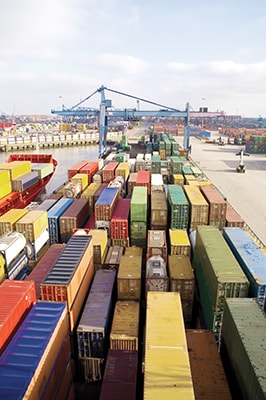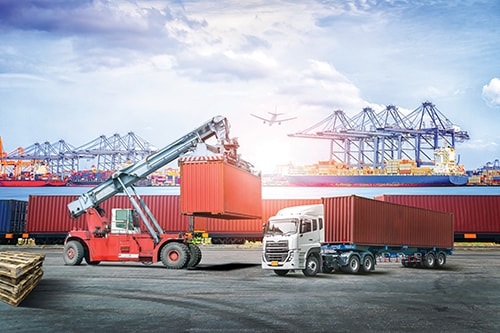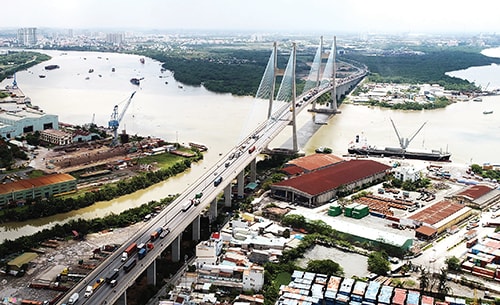(VLR) (Vietnam Logistics Review) HCMC has a developed logistics system and it is of the first magnitude in the Southern Key Economic Zone and in the country as well. In the time of integration, HCMC should have a program to make it a key economic sector as soon as possible.
(Vietnam Logistics Review) HCMC has a developed logistics system and it is of the first magnitude in the Southern Key Economic Zone and in the country as well. In the time of integration, HCMC should have a program to make it a key economic sector as soon as possible.
Reality of HCMC’S logistics infrastructures
Road transport in HCMC has been developing quickly, playing an important role in transporting cargo; sea and river way transport are relatively stable; and air transport is in a small proportion only. Transport activities from HCMC to other countries worldwide (mostly by seaway) have had a slower growth than those from HCMC to other places (road and riverway).
 | |
According to Vietnam Port Association (VPA), HCMC ports ranked first nationwide on the quantity of containers going through them, accounting for 58.81% of the market share. And Tan Cang- Cat Lai (dist.2) accounts for 48% of the national market share and 80.89% of the market share in HCMC ports. It is because the port is located near the center of HCMC- near industrial parks and warehouses of enterprises’ in Dong Nai and Binh Duong, and because there are adequate logistics services: warehousing, forwarding and many international liners as well.
According to the Civil Aviation Authority, Tan Son Nhat airport was designed to received 23m of passengers in 2020. However, in 2014, the airport received 22,140,348 passengers and 408,006 tons of cargo. In 2015, it received over 25m of passengers, surpassing the designed capacity. Although it is going to be expanded north over 8ha, it can increase its designed capacity to 25m of passengers pa.
HCMC currently has no railway connecting to seaports. There is only a North-South railway going through provinces and ending at Saigon Station. According to the plan approved by the Government, HCMC will have 8 metro routes. Especially, with the three developing routes, city railroad is basically connected to areas of high urbanization growth in HCMC.
Reality of logistics centers
After implementing relocation plans of the ports of Saigon, Tan Cang and ICD Truong Thu- Thu Duc, there are two large seaports left: Hiep Phuoc and Cat Lai. Tan Cang- Cat Lai is currently the largest and the most modern container terminal in Vietnam. It is located near industrial parks and processing zones north of HCMC and those in Binh Duong and Dong Nai. The port has area of 130ha, 1,424m of berths (8 berths) and is well equipped for port exploiting optimization. To develop to a logistics center of Type 1 of the Southern area, Saigon Industrial Park Development Company Ltd., has had a project of building a logistics center of 66 ha in Cat Lai port and the next 40 ha at Cat Lai Industrial Park (Phase 2). This is the content belonging to the City’s Export Restructuring Program in 2008-2010 and the People’s Committee of HCMC approved the planning of logistics area in Cat Lai (according to the Document no.4278/VP-TM dated June 18, 2009 by the People’s Committee of HCMC).

Tan Cang- Hiep Phuoc has an area of 18.7ha, with a berth of 420m, storage yard of 17ha and the capacity of 9m tons of cargo annually. Located in the strategic position between the Southern of HCMC and the East Sea, connecing boundary roads and the number of industrial parks, the port is a consolidating point of industrial parks South of the city and of the Mekong Delta. Tan Cang Saigon Co., has been investing in 5,000 meter of berth, 300ha of storing yard and building a container terminal and a general port at Hiep Phuoc Indusrial Park.
Besides the two above areas, Hi-Tech Park (dist. 9) has finished a bonded warehouse and a logistics center of over 10ha in order to meet the needs of local distribution and export for enterprises in the park and in surrounding provinces. The logistics center includes systmes of bonded warehouses, taxsuspension warehouses, container- freight stations (CFS), normal warehouses, cold storages and container yard functioning as a point of local ICD. With the position nearby the boundary road 2, on the borders of provinces of Dong Nai, Binh Duong and BR-VT, it will develop full-package logistics services with transport modals of road, waterway and airway.
Reality of providing and using logistics services
There are currently 3,000 enterprises operating in all forms of logistics services, 70% of them has office in HCMC and 30 of them are multi-national corporations. Howver, foreign enterprises accounted for 7080% of the sea transport market share in Vietnam: transporting export goods from Vietnam’s ports abroad and vici versa. Local enterprises held around 25% of the market share only. In general, local enterprise operated in the country and provided simple 2 PL logistics services: forwarding, transport, warehousing, customs brokerage... Most local enterprises played the role of satellite service providers for foreign ones. Shortage of capital and human resouce were basic factors for weak competitions to foreign ones. Besides, IT application was limited. Most local enterprises’ website lack utilities customers need as cargo tracking tools, B/L tracking, ship schedule or e-booking... Currently, local enterprises have upgraded their logistics services to 3P, developed e-logistics and efficient supply chain management. Some have taken part in paticular 3PL strategic model as Vinafco, Tan Cang- Saigon, Transimex Saigon, ITL Gemadept, Vinalink...

In term of using logistics services, most local enterprises have not been aware of the importance and efficiency of using logistics services: they misrecognize logistics with transport services or warehousing, and they have not had the habit of using out sourcing services, which leads to high production and transport costs, and thus weakens their competition abilities.
Several solutions to develop logistics in HCMC
Forming and developing 3PL full-package logistics service market on the basis of optimized connections of infrastructure, warehousing and transport; of legal enviroment, transparent efficient governmental logistics managements; and of professional logistics business community with qualified human resource and modern technology so that they are able to provide 3PL full package logistics services with competitive price and to meet the needs from enterprises of import- export and distribution (wholesale, retail).
Forming a network of logistics centers (distribution centers) for cargo transshipment, and for urban supply chains (super markets, retailers...). Developing logistics centers serving transshipment between HCMC and provinces. Having orientation of developing e-logistics, having assisting policies to support enterprises who apply modern technology in logistics management; identifying conditions to assist developments of logistics service providers.

Forming a distribution network to make it a plac of consolidating, storing ,and providing goods for supply chains operating in the city (supermarkets, retailers...) These centers should be located at transport hubs as airports, ports, railway stations or on lagre routes in the outskirt... They should be suitable to the master plan for economic- social developments, to plannings from other related sectors and to land budget as well.